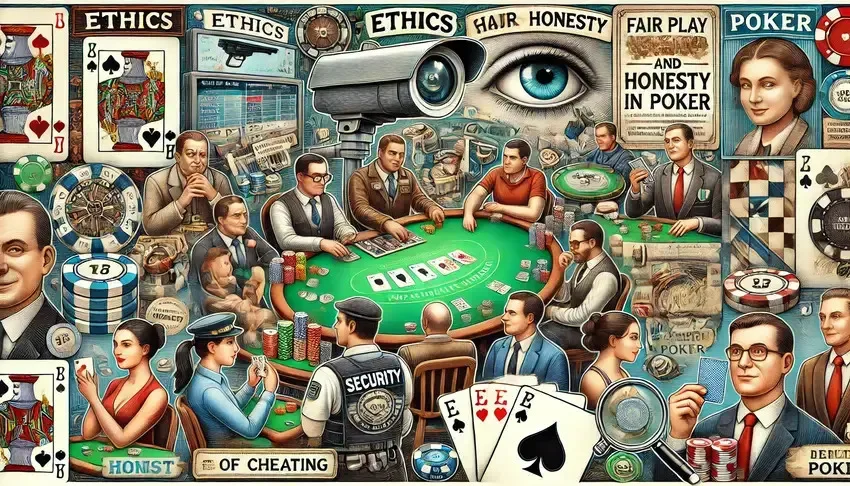
Ethics and Honesty in Poker: How to Avoid Cheating
Poker, a game of skill, strategy, and a bit of luck, is enjoyed by millions around the world. However, with its increasing popularity, the issue of cheating has become a significant concern. Ensuring ethics and honesty in poker not only maintains the integrity of the game but also fosters a fair and enjoyable environment for all players. In this article, we will delve into the types of fraud in poker, the signs of such unethical behavior, methods to prevent cheating, and the ethical standards every poker player should uphold.
Types of Fraud in Poker
Fraud in poker can take many forms, ranging from collusion to using sophisticated technology. Understanding these types helps in identifying and preventing them:
- Collusion: This occurs when two or more players conspire to gain an unfair advantage. They might share information about their hands or use signals to coordinate their play, thus skewing the game in their favor.
- Marked Cards: Cheaters might mark cards in subtle ways to identify them during play. This gives them an unfair insight into the cards others are holding.
- Card Switching: Some players might attempt to switch cards with those hidden on their person or in nearby locations, ensuring they always have a favorable hand.
- Online Poker Bots: In online poker, the use of automated bots can be a significant issue. These programs play the game based on algorithms and can make decisions faster and more accurately than human players.
- Ghosting: This involves a stronger player advising a weaker player during a game, often through hidden communication channels, thereby unfairly influencing the outcome.
Signs of Fraud in Poker
Identifying signs of cheating can be challenging but is crucial for maintaining the game’s integrity. Here are some indicators:
- Unusual Patterns: Consistently unusual betting patterns or unlikely winning streaks can suggest foul play.
- Frequent Wins: A player who frequently wins against all odds might be exploiting some form of cheating.
- Suspicious Behavior: Players who appear overly secretive or are frequently engaging in conversations that are unrelated to the game may be colluding.
- Irregular Card Handling: Any odd handling of cards, such as repeatedly touching them or shuffling in a peculiar manner, can be a red flag.
- Technical Glitches: In online poker, unexplained technical issues or consistent lag at crucial moments could indicate the presence of bots or other fraudulent software.

Methods of Prevention of Fraud in Poker
Preventing fraud in poker requires vigilance and the implementation of robust security measures:
- Surveillance and Monitoring: Using cameras and surveillance in physical poker rooms helps monitor players’ behavior and detect any irregularities.
- Randomized Decks: Frequently changing and randomly shuffling decks can prevent card marking and switching.
- Advanced Software: In online poker, employing advanced software to detect bots and monitor unusual activity is essential.
- Player Education: Educating players about the signs of fraud and encouraging them to report suspicious activities can create a self-regulating environment.
- Strict Rules and Penalties: Implementing strict rules against cheating and ensuring severe penalties for those caught can deter fraudulent behavior.
Ethical Standards in Poker
Maintaining ethical standards in poker is vital for the game’s integrity. Every player should commit to the following principles:
- Fair Play: Always play fairly and encourage others to do the same. Avoid any behavior that might give you an unfair advantage.
- Transparency: Be transparent in your actions and avoid any secretive behavior that could be construed as cheating.
- Respect for Opponents: Treat all opponents with respect and recognize that poker is a game meant to be enjoyed by all.
- Adherence to Rules: Strictly adhere to the rules of the game and support the enforcement of these rules to maintain fairness.
- Reporting Unethical Behavior: If you notice any form of cheating, report it to the relevant authorities immediately. This helps maintain the integrity of the game and ensures a fair environment for all players.
Ethics and honesty in poker are crucial for preserving the game’s integrity and ensuring a fair and enjoyable experience for all players. By understanding the types of fraud, recognizing the signs, implementing preventive measures, and adhering to ethical standards, we can collectively work towards a cleaner and more trustworthy poker environment. Let’s play our part in keeping poker a game of skill, strategy, and genuine competition.




